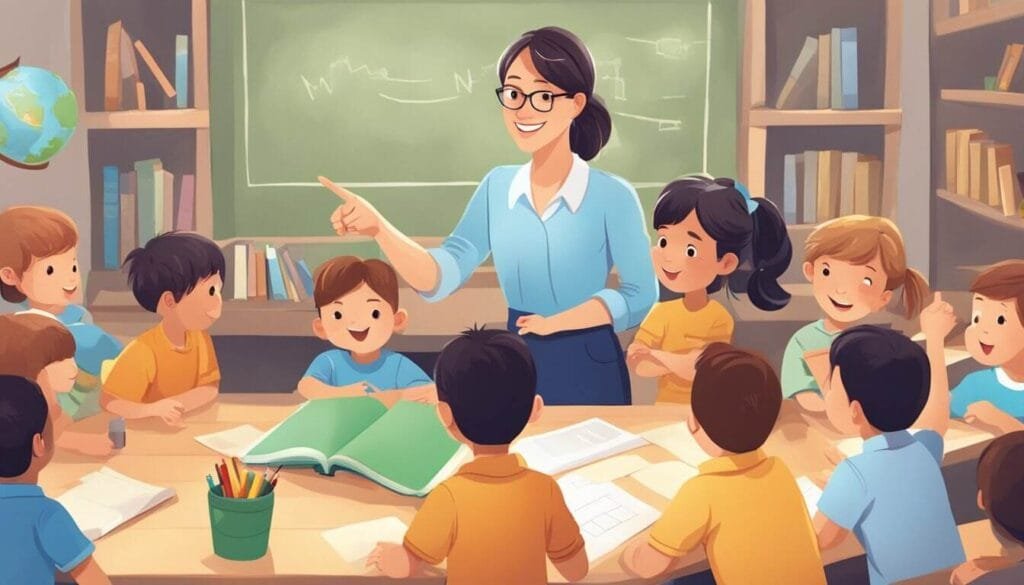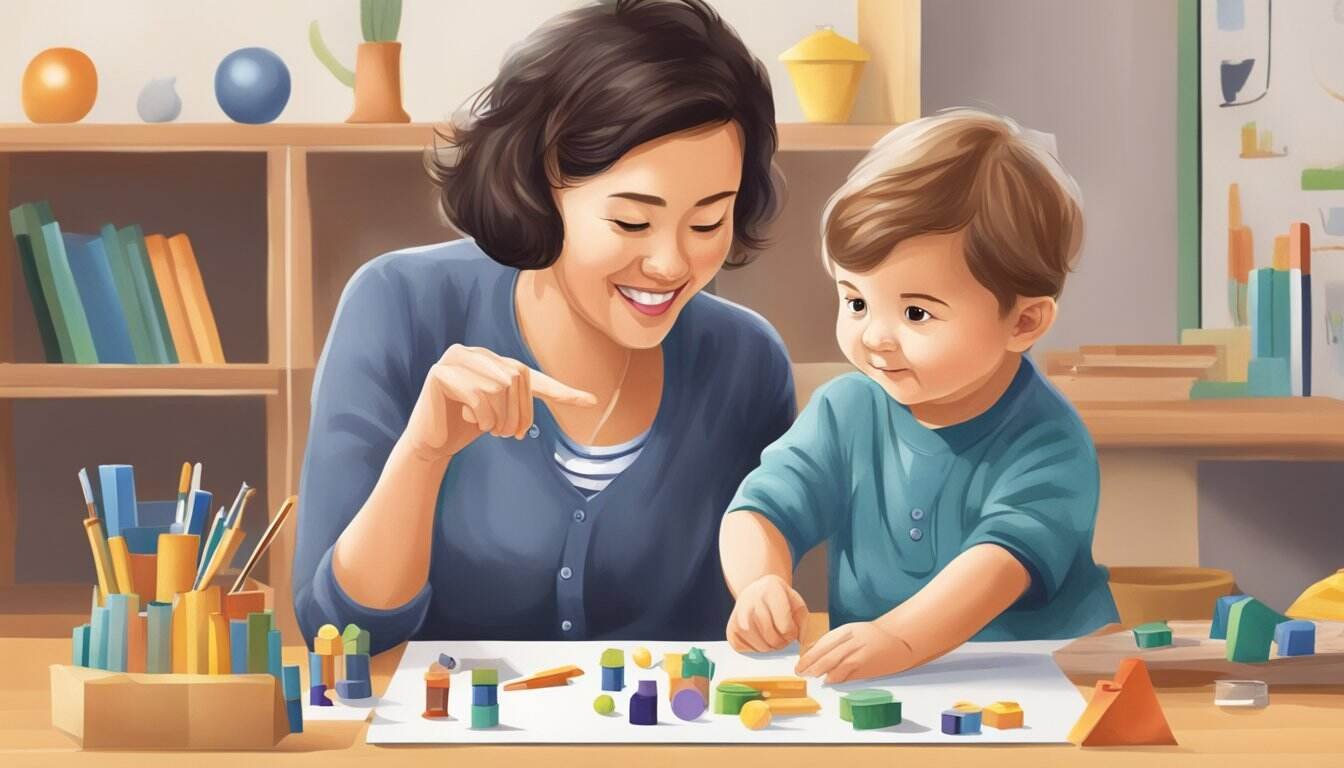Children start understanding the world around them from the moment they’re born. Their brains are like sponges, soaking up information and making sense of their environment. As they grow, their ability to comprehend and respond to the world expands rapidly.
By age 2, most toddlers can understand and follow simple directions. This is a big step in their development. It shows they’re making connections between words and actions. You might notice your little one grabbing their favorite toy when you ask or coming to you when called.
As kids get older, their understanding gets more complex. They start to grasp abstract ideas and follow longer instructions. Every child is different, though. Some may understand earlier, while others take a bit more time. What’s important is that you see steady progress in your child’s ability to make sense of the world.
Key Takeaways
- Children begin understanding from birth, with major leaps in comprehension occurring in the first few years
- Toddlers typically understand simple directions by age 2, marking a significant milestone in development
- Each child’s path to understanding is unique, with steady progress being more important than exact timing
Early Communication Milestones

Children start communicating from birth. They use different ways to express themselves as they grow. These milestones show how kids learn to talk and understand others.
Crying to Babbling Transition
Babies cry to show their needs at first. By 2-3 months, they start making cooing sounds. Around 4-6 months, they begin to babble. Babbling sounds like “ba-ba” or “ma-ma” without meaning.
At 6-7 months, babies respond to their name. They may turn when you call them. By 9 months, many babies understand “no” and wave “bye-bye”.
Between 7 and 12 months, babies use sounds to get attention. They might point at things they want. This is when real communication starts to develop.
First Gestures and Vocabulary Expansion
Around 12 months, most babies say their first word. Common first words are “mama,” “dada,” or “uh-oh.”. They also use gestures like pointing or reaching to communicate.
By 18 months, kids usually know 10-20 words. They start to use simple phrases like “all gone” or “more juice.”. At this age, they can follow basic commands like “come here.”.
Between 18 and 24 months, vocabulary grows quickly. Kids learn new words every day. They start putting two words together, like “want milk” or “go outside”.
By age 2, most kids use 50 or more words. They can name body parts and common objects. Their sentences get longer as they approach age 3.
Language Skills Development
Language skills grow rapidly in young children. Kids learn to understand words and use them to communicate. This happens in stages as their brains develop.
Understanding Simple Words and Commands
Babies start to understand simple words around 6–9 months old. They can respond to their name and words like “no” or “bye-bye.”. By 12 months, most understand simple phrases like “put the ball in the box.”.
As toddlers, kids can follow basic instructions. You might say, “Bring me your shoes,” and they’ll do it. Their vocabulary grows quickly too. By age 2, most children know about 50 words.
Simple words lead to simple sentences. Your child might say “want juice” or “go outside”. These short phrases show they’re linking ideas together.
Recognition and Use of Pronouns
Pronoun use is a big step in language development. It usually starts around age 2–3. Your child will begin to use “I,” “me,” and “you” correctly.
Before this, kids often refer to themselves by name. They might say “Tommy wants a cookie” instead of “I want a cookie”. Using “I” shows they see themselves as separate from others.
Understanding “you” and “me” can be tricky. Your child might mix them up at first. With practice, they’ll get better at using the right pronoun for each person.
By age 4, most kids use pronouns like “he,” “she,” and “they” correctly. This shows they can talk about people who aren’t there.
Cognitive and Conceptual Growth
Children’s minds grow rapidly as they learn to understand the world around them. They start to grasp basic ideas and make connections between different concepts.
Grasping Cause and Effect
Young kids begin to understand cause and effect around age 2. This is when they realize their actions can make things happen. For example, they learn that pushing a button turns on a toy.
As they get older, kids grasp more complex cause-and-effect relationships. By age 4 or 5, you might see your child figure out that rain makes puddles or that eating too much candy can cause a tummy ache.
This skill helps them make sense of their world. It also lets them predict what might happen next in different situations.
Identifying Spatial Concepts
Spatial concepts involve understanding where things are in relation to each other. Kids start learning these ideas early on. By age 3, most can use words like “in,” “on,” and “under.”
As they grow, children get better at judging distances and sizes. They learn to describe locations using terms like “behind,” “next to,” and “between.” This helps them navigate their environment and follow directions.
Spatial skills are key for many activities. They help with tasks like putting puzzles together, building with blocks, and reading maps. These abilities also form a base for later math and science learning.
Advances in Receptive and Expressive Language
Children make big jumps in how they understand and use language. Their skills grow quickly as they learn to grasp more complex ideas and speak in longer sentences.
Understanding Complex Sentences and Instructions
At around age 3, kids start to follow two-step directions. You might say, “Please get your shoes and put them by the door.” Your child can now do both tasks in order.
By age 4-5, children can handle even more complex instructions. They can follow a series of 3 or more commands. Your child may also start to understand time concepts like “yesterday” and “tomorrow.”
Kids begin to grasp humor and word play at this stage too. They might laugh at simple jokes or puns. This shows their growing ability to think about language in new ways.
Developing Comprehension of Complex Ideas
As receptive language skills improve, kids start to understand more abstract concepts. By age 5, your child can likely talk about feelings and ideas that aren’t tied to concrete things.
They start to grasp cause and effect. You might hear your child say things like, “If it rains, we can’t go to the park.” This shows they’re thinking about how events connect.
Children also begin to sort things into categories. They might group animals by where they live or what they eat. This skill helps them organize information and learn new concepts more easily.
Key Developmental Stages
Children reach important milestones in their early years. These stages show how they grow in their ability to communicate and think.
First Birthday Communication Benchmarks
By their first birthday, most babies can say a few simple words. They often use “mama” and “dada” correctly. At this age, babies start to understand simple directions. They may wave goodbye or shake their heads “no” when asked.
Babies also begin to recognize their name. They might turn when called. Many can point to familiar objects when asked. They start to use gestures to communicate their wants and needs.
Some babies at this age can use past tense words. For example, they might say “all gone” after finishing a meal.
Progression in Classification and Counting Abilities
As children grow, they get better at grouping things. By age 2-3, kids can sort objects by color or shape. They start to understand “big” and “small.”
Counting skills develop slowly. At first, kids may recite numbers without understanding them. By age 3-4, many can count a few objects correctly.
Children learn to group things in new ways as they get older. They might sort toys by type or color. This skill helps them make sense of their world.
Abstract thinking develops later, around age 11–12. At this stage, you can solve more complex problems in your head.
Frequently Asked Questions
Children develop understanding at different rates. Key milestones in comprehension occur during the first few years of life. These relate to discipline, affection, self-awareness, speech, following instructions, and emotions.
When do toddlers start to grasp the concept of discipline?
Toddlers begin to grasp discipline around 18 months to 2 years old. At this age, they start to understand cause and effect. They can link their actions to consequences.
You might notice your child testing boundaries more often. This is a normal part of development. Consistent, gentle discipline helps them learn right from wrong.
At what point in their development do babies recognize and respond to affection such as kisses?
Babies can recognize and respond to affection like kisses as early as 3 to 4 months old. You may see them smile or coo when you show affection.
By 6 months, many babies actively seek out affection. They might reach for you or lean in for kisses. This shows their growing understanding of emotional connections.
At what age do children typically begin to respond to their own name?
Most children begin to respond to their own name between 5 and 7 months old. You might notice your baby turning their head when you call them.
This is an important milestone in cognitive development. It shows your child is starting to understand language and recognize themselves as separate from others.
By which age should a child be able to speak clearly?
Children typically speak clearly by age 4 to 5. By this time, most kids can say most sounds correctly and be understood by strangers.
Remember, every child develops at their own pace. Some may speak clearly earlier, while others might need more time. If you’re concerned about your child’s speech, talk to your pediatrician.
From what age can children generally understand and follow simple instructions?
Children can usually understand and follow simple instructions around 12 to 18 months old. You might ask them to “bring me the ball” or “put the toy in the box.”
By age 2, most toddlers can follow two-step instructions. For example, “Please pick up your shoes and put them in the closet.”
How early in their lives do children begin to understand and process emotions?
Children start to understand and process emotions very early in life. Babies as young as 2 months old can show basic emotions like joy, anger, and sadness.
say,By age 2 to 3, children begin to label their emotions. They might say “I’m happy” or “I’m mad.” This is an important step in emotional development.





